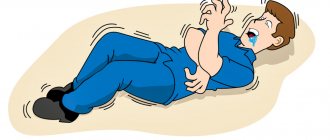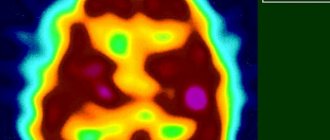In the second half of the 19th century, there lived a scientist named Hermann Ebbinghaus. He devoted his life to studying how memory works, and in the course of his research he discovered the basic principles of its operation. One of these principles is called the forgetting curve. We will talk about it below.
You can find out how memory works and what methods of effective memorization exist in the online program “Mnemonics”.
Characteristics and classification
Memory is a function that allows a person to assimilate, store, retain in consciousness and, if necessary, repeatedly reproduce learned information. Cognitive abilities are interconnected with brain activity. Damage to the medulla of any etiology leads to disruption of cortical functions, which affects the ability to memorize and remember.
The ability to remember and store information is interconnected with the activity of all brain structures, but most of all with the hippocampal system, which is involved in memory consolidation (the process of transition from short-term to long-term). Severe memory disorders, called amnesia, are usually associated with previous episodes of stroke and TBI or a tumor localized in brain tissue.
Statistics show that about 3-20% of people over the age of 65 face the problem of forgetfulness, which significantly impairs the quality of life and safety conditions. In 40-80% of older people, cognitive impairment is mild. There are types of diseases when forgetting recent events becomes the leading symptom. The classification involves dividing cognitive impairments according to severity:
- Lungs. Deterioration of operational working memory (a system of limited capacity where information to be processed is temporarily stored). Working memory is used for current mental activity, reasoning, decision-making, and selection of a relevant behavior model that is adequate to the current situation.
- Moderate. Deterioration in the function of remembering and reproducing previously memorized information.
- Heavy. Memory degradation. Deterioration of all types of memory - operational, short-term, long-term.
In severe cases, a diagnosis of dementia is made. A mandatory diagnostic criterion for dementia is a combination of impairments in memory and other cognitive functions - speech, perception of reality, mental activity, ability to predict and plan.
What is known about Alzheimer's disease?
❗️Alzheimer is a gradual self-destruction of brain cells, which at first occurs imperceptibly and then rapidly. As a result of destructive processes (the appearance of neuritic plaques and neurofibrillary formations), dementia develops - age-related dementia. Although the disease can appear at a relatively early age. For example, with a hereditary predisposition, it can awaken at the age of forty, and Alzheimer's disease is also associated with Down syndrome. In this case, even a child can get sick.
► Alzheimer's syndrome got its name thanks to the German psychiatrist Alois Alzheimer. It was he who drew attention to the characteristic symptoms (1907).
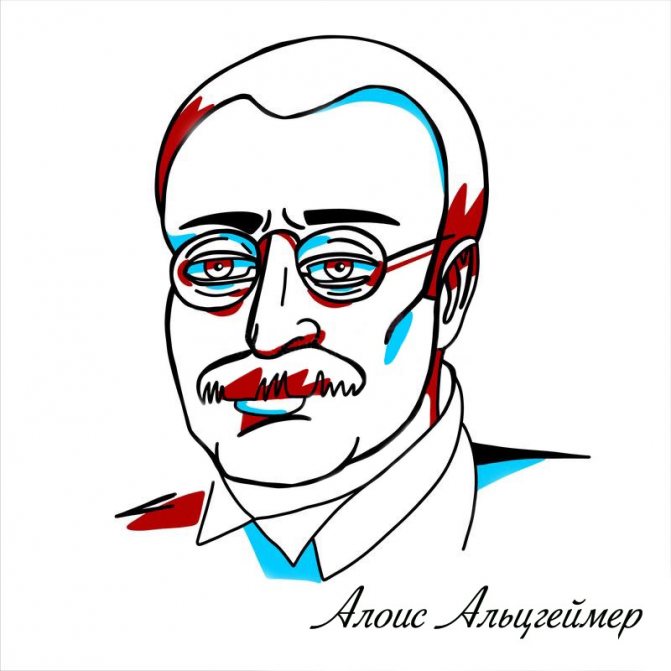
► After this, many doctors studied the disease, and Emil Kraepelin brought it into a separate category.
Reasons for development
The causes of cognitive impairment are associated with somatic, neurological, psychiatric diseases and conditions, which include:
- Neurodegenerative, including Alzheimer's and Parkinson's diseases.
- Vascular pathologies, including ischemic and hemorrhagic strokes, chronic ischemic processes occurring in brain tissue.
- Encephalopathies of dysmetabolic origin.
- Neuroinfections.
- Intoxication.
- Demyelinating diseases.
- Injuries in the head area.
- Tumor processes.
- Disturbance of cerebrospinal fluid dynamics.
- Pregnancy.
- Depressive state, neuroses.
Most of the listed diseases are accompanied by the appearance in the medulla of numerous foci with an altered morphological structure, which leads to functional disorders in the functioning of the brain. Risk factors: old age, atherosclerotic lesions of cerebral vessels, history of arterial hypertension.
The reasons for the condition when you quickly forget everything can be associated with endocrine diseases, which are called dysmetabolic disorders and are associated with disorders such as hypothyroidism (deficiency of thyroid hormones), liver and kidney failure, and lack of B vitamins.
Memory deterioration occurs with long-term use of certain drugs. These include tricyclic antidepressants, antipsychotics (suppress mental activity, eliminate hallucinations, delusions and other symptoms of psychosis), anticholinergic drugs (used to treat parkinsonism and extrapyramidal disorders), benzodiazepines (have anticonvulsant, sedative, hypnotic, muscle relaxant effects).
Alzheimer's disease
The condition when you forget words and recently occurring events is called Alzheimer's disease, which in clinical practice is considered as the main cause of dementia in old age. The disease is characterized by progressive damage and death of neurons. In the later stages of the course, the patient loses the ability to self-care, and irreversible gross impairments of cognitive functions and behavior are observed.
Cerebrovascular pathologies
Pathologies of the circulatory system that feeds the brain occupy second place after neurodegenerative diseases among the causes of memory impairment and the development of dementia. A disease when a person forgets everything is called a disorder of cerebral blood flow, which can occur in both chronic and acute forms. The main reasons: atherosclerotic vascular damage, arterial hypertension, impaired neurohumoral regulation of vascular wall tone. Provoking factors: diabetes mellitus, history of lipid metabolism disorders.
Multiple sclerosis
One of the diseases where you don’t remember anything is called multiple sclerosis, in clinical practice it is considered as a demyelinating disease. This is an autoimmune pathological process of a chronic, progressive course, which is characterized by damage to the myelin sheath covering the nerve fibers.
Due to the destruction of the myelin sheath, which protects nerve fibers from damage and improves the transmission of nerve impulses, multifocal damage to the nervous system occurs. The disease is accompanied by neurological symptoms, including deterioration of memory and other cortical functions.
Injuries in the cranium area
Traumatic injuries to the skull and brain matter lead to disruption of brain function, which provokes memory impairment when you forget everything.
In mild to moderate TBI, impairment of memory and other cortical functions predominates over other neurological symptoms. TBIs occupy third place after vascular and neurodegenerative diseases in the total mass of pathologies that most often provoke memory impairment. Cognitive disorders develop as a result of mechanical damage to brain structures (compression, crushing) and other damaging factors - hemorrhage, edema, brain dislocation, disruption of liquor dynamics and cerebral blood flow.
What is Alzheimer's disease?
❗️So, an unpleasant, and most often fatal, diagnosis has appeared in your loved one’s card and you don’t know what to do with this information. The natural desire is to find everything you can on request - Alzheimer's disease, what kind of disease it is and what are the consequences of the disease. But scientific and medical articles are replete with special terms that are understandable only to specialists, and only make the common man feel despondent.
I will try to help in this matter and explain in simple language the nature of the disease, the reasons for its occurrence, methods of treatment and prevention, if any. Unfortunately, it is impossible to prevent the occurrence of this syndrome. The onset of the disease is hidden deep in the brain, and even the person himself may not realize that the countdown timer for his last days has already been turned on.
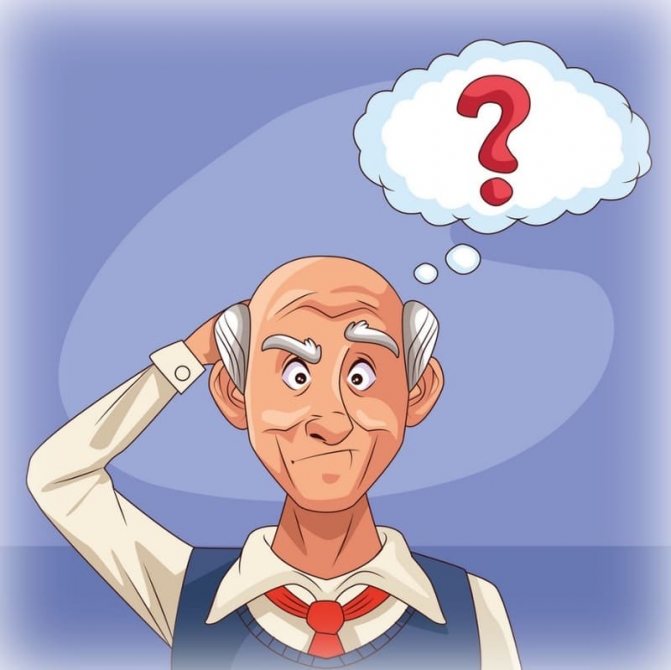
Associated symptoms
To establish the exact cause of memory impairment and make a differential diagnosis, the doctor pays attention to the dominant signs. In diseases that cause memory impairment, accompanying symptoms are observed:
- Pain in the head area.
- Nausea, attacks of vomiting.
- Convulsive syndrome.
- Paralysis, paresis.
- Impaired motor coordination.
- Speech dysfunction.
- Inability to navigate in time and space.
- Inability to maintain balance, dizziness.
- Confusion of consciousness.
- Sensitivity disorder.
Vascular pathologies that occur in a chronic form lead to the development of discirculatory encephalopathy, for which the following symptoms are typical: hypokinesia (limitation of the volume and speed of voluntary movements), pseudobulbar syndrome (dysphonia - decreased strength and sonority of the voice, dysarthria - impaired speech pronunciation, dysphagia - impaired swallowing , enhanced reflex reactions of oral automatism).
At the same time, signs are revealed: increased tone of skeletal muscles, gait disturbance, increased tendon reflexes of an asymmetrical nature. In multiple sclerosis, pronounced motor disturbances are observed, including pathological pyramidal reflex reactions, decreased skeletal muscle tone, paresis, and increased fatigue.
Other symptoms: ataxia (impaired coordination in the movement of a muscle group), intention-type tremor, dysmetria (excessive or insufficient amplitude of voluntary, purposeful movements), nystagmus (frequent oscillatory movements of the eyeballs), deterioration of visual acuity and other disturbances of visual function.
Stages of the disease
✔️ Dementia is one of those ailments that progress; gradually the patient’s condition only gets worse. This disease is individual in nature and can manifest itself in different ways. However, there is a pattern that is typical for everyone affected by this disaster. Symptoms change over time due to the fact that the brain is destroyed gradually, at an increasing rate.
✔️ How Alzheimer's disease begins, the first signs: first, the disease deprives the ability to build logical chains, reasoning and destroys memory. The outcome of the disease is sad - a person loses connection with his body, all body systems stop functioning, one after another. The manifestation of Alzheimer's disease depends on which area of gray matter is most affected. There are several stages that are considered to be the development pattern of the disease. But deviations in one direction or another are possible.
Stages of Alzheimer's disease:
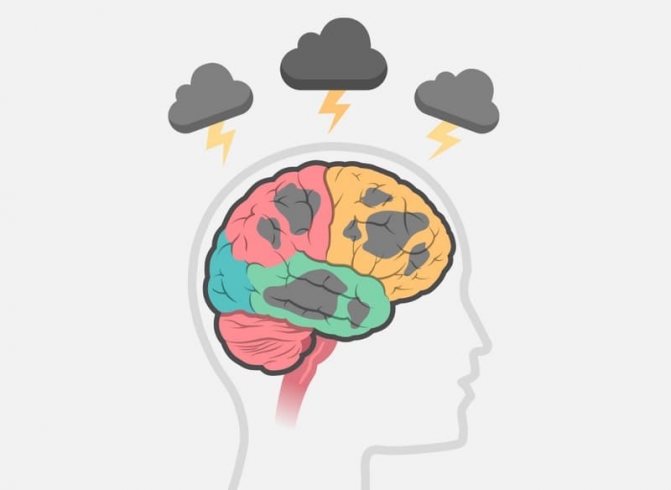
1. At the first stage, the patient does not feel any changes in his behavior, and does not show any external signs that he has been affected by the disease. Early Alzheimer's is characterized by internal harmful processes that begin inside the head. Clusters of abnormal protein are just beginning to form, but neural connections are still functioning. The connection between cells is not disrupted to a noticeable extent, the person does not experience problems with memory, coordination and logic.
2. When the second stage (stage) of the disease begins, others may notice mild symptoms of the disease. Most often, episodic lapses in memory occur, a person loses small objects - keys, phone and forgets that he is supposed to meet someone. These minor troubles, in general, do not greatly impair the quality of life. They remain, also barely noticeable to the eyes of loved ones and doctors. Such manifestations are usually attributed to age.
3. At the third stage, behavioral features associated with communication and memory become more noticeable. The person forgets names and does not remember recently received information. Things get lost more often, and planning actions becomes a problem. Difficulties arise with organizing the work process and managing time. At this stage, doctors can make a diagnosis using special tests. This stage is still considered mild.
4. In the fourth stage, confusion and memory problems become more apparent. Dementia is noticeable to others and doctors. Not only short-term memory is lost, but also long-term memory. Gaps in memories visit the patient more and more often, although they are much more aware of the events of long ago. For example, childhood and adolescence. At the same time, they may forget about the existence of their own children or confuse them with their parents. The ability to perform arithmetic calculations degrades, and a person is no longer able to independently engage in monetary transactions. The patient withdraws into himself, becomes withdrawn and increasingly silent; contacts with people cause him emotional discomfort and anxiety.
5. Deterioration of the condition at this stage turns a person’s independent life into a problem. He is no longer able to cope with ordinary daily activities and needs care. The destruction of the brain reaches the stage when the patient does not understand where he is now, does not realize the date. The address of residence and important telephone numbers are lost from memory. To fill the discomforting void in his memory, he clings to remnants of memories and repeats his stories over and over again, as if he were playing a record without realizing it.
Some vital functions are still preserved, and the patient is able to partially care for himself, with the help of guardians or nurses. Perhaps he still remembers his name and has not forgotten the names of his family members. The ability to independently eat and cope with the natural needs of the body is, as a rule, not yet lost at this stage.
6. The penultimate stage of the disease is characterized by the beginning of the destruction of personality. Consciousness becomes more confused, and actions lose motivation. In this state, a person who has retained physical strength can leave home and get lost. Due to disorientation, he will not be able to give his home address, and sometimes even his own name.
Such people experience visions or strange thoughts, visual hallucinations and obsessive states. The ability to recognize faces is lost, but anxiety and excitability appear. Uncontrollable movements appear in the form of rocking, nodding your head or wringing your hands. The condition worsens in the afternoon (evening confusion). The patient needs constant monitoring and supervision. He is like a baby, incapable of independent simple actions - washing, dressing, going to the toilet, eating. There are problems with sleep. The regime of wakefulness and rest is disrupted.
7. The last stage of development of the syndrome is final. The sufferer increasingly loses contact with the outside world and his own body. Brain damage is extensive and local. A person is no longer able to take care of himself even in the simplest actions; all body systems fail. Reflexes such as swallowing, defecation and urination are lost. There is a risk of infection. Even if a person does not have such extreme complications, the syndrome is still life-ending. Destruction of the brain leads to disruption of all vital functions, shutdown of breathing and cessation of heart function.
Causes and risk factors
It is extremely difficult to read such articles, especially if the misfortune has affected someone close to you. I would like to understand, find out the causes of Alzheimer's disease, methods of treatment and prevention of the disease. Doctors and scientists still don’t know why Alzheimer’s disease occurs. Research in this direction is being conducted in the most progressive scientific institutions. Our brain is one of the biggest mysteries of the universe.
Nevertheless, the researchers managed to derive a certain system and compile a list of possible causes of the disease.
- The accumulation of aluminum in the body can cause illness;
- Genetic predisposition;
- Head injuries;
- The effects of nitrates on the body;
- Autoimmune diseases, immune pathologies;
- Risk factors are considered to be bad habits, hypertension, and frequent infectious diseases.
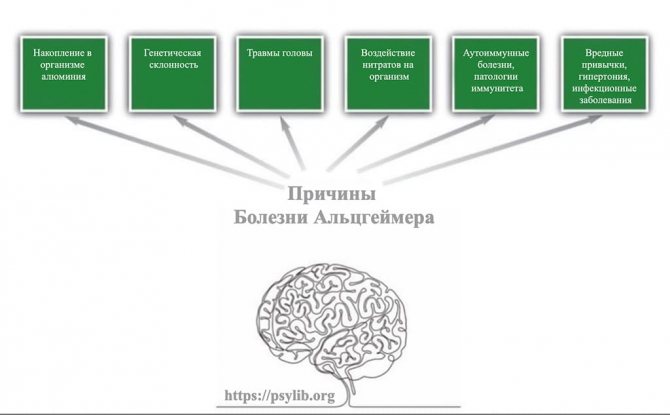
Treatment and prevention
Although the disease has no cure, people with Alzheimer's disease can get relief from symptoms and prolong one of the milder stages. For this purpose, medications and means of overcoming psychological discomfort are used. Scientists have noticed that people who are prone to mental activity are less likely to become targets for syndrome “A”. This is probably due to the large number of neural connections. The more diverse a person’s intellectual activity is, the more of them are formed. This means that the brain can continue to work around the affected areas.
☝️ Solving complex intellectual problems is a good disease prevention. People who devote themselves to mathematics, learning languages and fine arts create an obstacle to the occurrence of disease. They solve complex problems every day, training their brains, creating new neural connections and strengthening existing ones. It is very useful to engage in new activities that require concentration and acquire skills that were not available or have been forgotten.
Alzheimer's patients are doomed, but they can maintain mental clarity and quality of life if steps are taken. With early diagnosis of the disease, there is a chance to slow down its development and avoid personality destruction. Therefore, it is so important to pay attention to the condition of older loved ones, and take timely measures to diagnose and alleviate symptoms.
Carolina Korableva
About the author: Hello! I am Karolina Korableva. I live in the Moscow region, in the city of Odintsovo. I love life and people. I try to be realistic and optimistic in life. What I value in people is their ability to behave. I am interested in psychology, in particular conflictology. Graduated from RGSU, Faculty of Occupational Psychology and Special Psychology.
Diagnostics
To make an accurate diagnosis, a comprehensive examination of a person who forgets everything is carried out, after which the doctor can tell the name of the disease and how to treat it. Instrumental diagnostic methods help determine the condition of brain structures and elements of the circulatory system supplying the brain. Basic research methods:
- CT, MRI.
- Angiography.
- Doppler ultrasound.
- Electroencephalography.
To assess cognitive abilities, tests are used that involve memorizing and reproducing pictures, words, and sentences. Mental status is assessed using the Montreal (MoCa test) and other cognitive scales. A blood test shows the level of hormones and vitamins, the concentration of glucose, cholesterol and other substances.
Best Repeat Modes
Doctor of Pedagogical Sciences V. Yu. Vasiliev in his book “Super Memory for Everyone” gives two memorization modes. The first mode is useful if you only have 2 days to memorize the material. The second is if the learning time is not limited.
Two-day repetition regimen:
- 1st repetition - immediately after you finish reading;
- 2nd repetition - 20 minutes after the first;
- 3rd repetition - 8-10 hours after the second;
- 4th repetition - a day after the third.
Long term repetition mode:
- 1st repetition - after you have finished reading;
- 2nd repetition - half an hour after the first;
- 3rd repetition - 24 hours after the second;
- 4th repetition - 3 weeks after the third;
- 5th repetition - six months after the fourth.
This mode is well suited for expanding your vocabulary. Make a list of 10-15 words. Write these words down in a notebook and set dates when they need to be repeated. Check your notebook periodically so you don't miss the next repetition.
There is also a memory mode for those who want to remember information forever. It was proposed by American scientists Hugh Thompson and Bob Sullivan in the book “The Plateau Effect”. This is what he looks like.
- 1st repetition - 5 seconds after reading the material;
- 2nd repetition - 25 seconds after the first;
- 3rd repetition - after 2-3 minutes;
- 4th repetition - after another 10 minutes;
- 5th repetition - after 1 hour;
- 6th repetition - after 5 hours;
- 7th repetition - every other day;
- 8th repetition - after 5 days;
- 9th repetition - after 25 days;
- 10th repetition - after 4 months;
- 11th repetition - after 2 years.
Take everything you learned from this article to heart, and the Ebbinghaus Forgetting Curve will help you avoid unnecessary repetition and pointless waste of time.
Have fun learning. Good luck!
We also recommend reading:
- Storytelling
- Logical memory and its development
- Non-nemonic memorization rules
- Types of memory and their features
- Game multiplication table (cards)
- Is it possible to count in your head and remember, like Daniel Tammet?
- Some Scientific Research on Superintelligence
- Spaced repetition method
- How to Improve Productivity Using the Zeigarnik Effect
- 7 rules for remembering information
- How to learn any language in a few months - tips from a polyglot
Key words:1Mnemonics
Treatment
Diseases in which memory function is impaired and you forget everything are treated taking into account the causes. Treatment at a medical center is indicated for acute disease with severe neurological symptoms or if surgical intervention is necessary, for example, to remove a tumor. Pharmaceutical drugs are used in the treatment of cognitive impairment:
- Phosphodiesterase inhibitors (Vinpocetine, Eufillin). They expand the vascular lumen, improving the characteristics (speed, volume) of cerebral blood flow.
- Calcium channel blockers (Nimodipine, Cinnarizine). They cause relaxation of the smooth muscles of the vascular wall, which leads to expansion of the vascular lumen.
- Alpha-adrenergic receptor blockers (Nitsergoline). Neutralize the effect of the neurotransmitters adrenaline and norepinephrine, which provoke a narrowing of the lumen of the vessel.
- Antioxidants, correctors of metabolic processes (Ginkgo Biloba).
- GABAergic (Piracetam).
- Peptidergic agents, amino acids (Actovegin, Glycine).
- Correctors of cellular metabolism (Encephabol).
Adequate therapy is possible after a comprehensive study of the patient’s health status. Elimination and prevention of progression of cortical dysfunction is carried out in a comprehensive manner. Treatment is provided for neurological and somatic diseases that are involved in the pathogenesis of the development of cognitive disorders.

